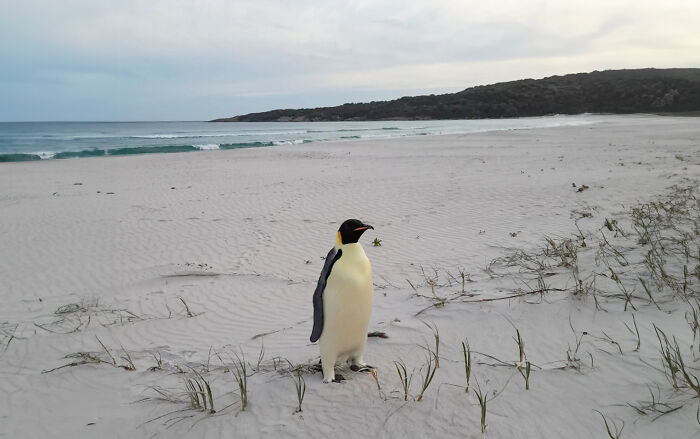
Rare Penguin Sighting in Australia: Emperor Penguin Gus Surprises Locals
Emperor penguins, the largest and heaviest of all penguin species, are typically found only in Antarctica, where they are accustomed to surviving in extreme conditions, including wind chills as low as -76°F. So, when an emperor penguin was recently discovered over 2,000 miles away from its icy home, stranded on a beach in Australia, locals were left astounded.

Aaron Fowler, a surfer, was one of the first to spot the penguin, which was later named Gus.
The penguin, an unprecedented visitor to Australia, appeared malnourished and far from its natural Antarctic habitat, a journey that raised questions about how and why it had traveled such a long distance.
The sighting occurred on November 1st in Denmark, a coastal town in southwestern Australia known for its popular beaches. The Department of Biodiversity, Conservation, and Attractions in Western Australia reported that the penguin was found in poor condition, prompting officials to safely remove it from the beach to protect it from potential dangers.
Though the exact cause of the penguin’s long journey remains unclear, the discovery marks the first time an emperor penguin has been found along the Australian coastline. As Dr. Belinda Cannell, a research fellow at the University of Western Australia’s School of Biological Sciences, pointed out, it’s highly unusual for these penguins to be so far from Antarctica. “Tracked penguins that are not breeding have never been observed outside the pack-ice regions or north of 60 degrees South,” she explained.
Carol Biddulph, a licensed wildlife rescuer, shared her amazement at being involved in the care of Gus. “Never in my wildest thoughts would I have thought I’d ever have an emperor penguin to care for,” she said. “It’s such a privilege to be part of this bird’s journey.”
Surfer Aaron Fowler, who first saw Gus on the beach, was in disbelief at the sight of the penguin. At first, he mistook it for a seabird, but as the bird came closer, he realized it was an emperor penguin. “This penguin was like something straight out of a documentary, perfectly formed, making all the penguin sounds,” Aaron recalled. “He tried to do a tummy slide like he would on the ice, but ended up faceplanting in the sand, shaking it off like he was surprised. It wasn’t until later, when we googled it, that we realized how extraordinary it was.”
The male penguin, nicknamed Gus, was found on a popular tourist beach in the town of Denmark in southwestern Australia

Despite his long journey, Gus appeared to be in good spirits and wasn’t particularly fearful of humans. Aaron speculated that Gus might have confused them with other penguins due to their wetsuits. “He wasn’t scared of us at all. We hung out for about 10 minutes, and he seemed pretty relaxed,” Aaron said.
Currently, Gus is receiving care as officials from the Department of Biodiversity, Conservation, and Attractions evaluate whether to return him to Antarctica. The case brings to mind the story of Happy Feet, another emperor penguin who made headlines in 2011 after being found in New Zealand—another rare occurrence for the species.
While the reasons behind such long, unusual migrations remain a mystery, the story of Gus is a remarkable one. Not only did it give the people who encountered him a once-in-a-lifetime experience, but it also offered Gus a rare opportunity to trade the frigid Antarctic climate for a sunny beach—an adventure few penguins will ever know.






